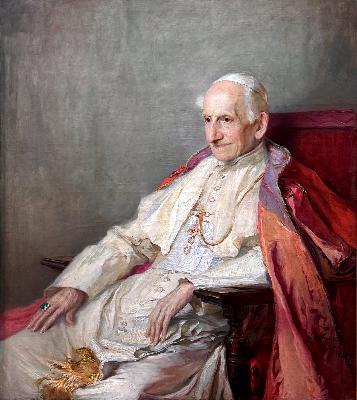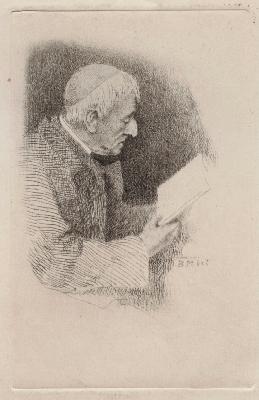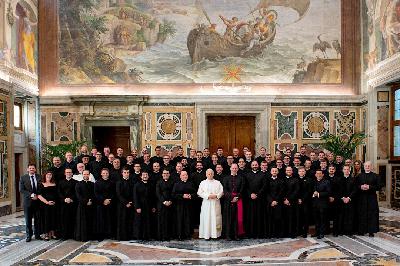Itching for New Foundations
Update: 2025-10-09
Description
By Michael Pakaluk.
But first a note: Be sure to tune in tonight - Thursday, October 9 at 8 PM Eastern - to EWTN for a new episode of the Papal Posse on 'The World Over.' TCT Editor-in-Chief Robert Royal and contributor Fr. Gerald E. Murray will join host Raymond Arroyo to discuss 'Dilexi te,' Pope Leo's first Apostolic Exhortation, the pope's planned trip to Lebanon, and his comments on Gaza, as well as other issues in the global Church. Check your local listings for the channel in your area. Shows are usually available shortly after first airing on the EWTN YouTube channel.
Now for today's column...
Ask an educated Catholic what the two leading teachings of Leo XIII's 1891 encyclical Rerum Novarum are, and, if he knows anything at all about this foundational text of modern Catholic social teaching, he will likely say that it endorses labor unions and articulates the principle of a living wage.
The doctrine of a living wage is indeed important, even if it cannot be followed in the United States today, given current mores and employment law. The doctrine is that to hire a father, who is the head of a household, is to hire in effect a family, not a mere individual, and therefore he must be paid a wage sufficient for supporting a large family, and sufficient too for him to save something, so as to acquire "substance" over time - on the assumption that his family lives modestly and thriftily.
As for the worker's associations envisioned in the encyclical, they do not exist primarily for collective bargaining, and "they must pay special and chief attention to the duties of religion and morality." (n. 57)
Despite our praise of Rerum Novarum as a fundamental founding document, one might reasonably judge that these two teachings have been pervasively abandoned.
But these are not the two leading teachings of the encyclical, which are rather that:
(1) socialism is a disastrous mistake which chokes the sources of wealth and subverts the family, and that
(2) no solution to "the problem of labor and capital," or to any other grave social problem, is possible without a revival of Christianity.
Leo XIII did not define socialism as "State ownership of the means of production," but rather, as a philosophy that denies that the individual in his economic activity is prior to the State, and denies also that the family is a true society prior to the State. In particular, it denies the authority of the father, who, Leo says, has a claim over the resources of his household at least as weighty as the State's.
Leo grapples with socialism in several of his encyclicals. He clearly regards it as the great menacing problem of our time. It would be foolish to suppose that such a deep challenge to Christian civilization, as he thought it to be, was put to rest by Fabian-style reforms in the direction of a Welfare State.
Rather, in our use of fiat currency, in our Great Society initiatives (which have undermined the family), and in the State's claim to redefine marriage, one sees this very philosophy of socialism.
Does anyone today suppose that limits to the taxing power of the State are fixed by natural law in the prior claims of the family as a true society? Or is it part of our public consciousness that the giant wealth transfer, which is Social Security, is a matter of free gift rather than putative "right" - a claim of right by the retired elderly over the resources of growing young families?
So, no, it seems we have not put to rest the "socialism" that Leo worried about.
As for the second, genuinely leading idea, it would be hard to claim that it conditions our interpretation of "Catholic Social Doctrine" today. I urge readers to read paragraphs 16-30 of the encyclical and ponder them anew: "No practical solution will be found apart from the intervention of religion and of the Church," Leo insisted, and "All the striving of men will be vain, if they leave out the Church." (n. 16) Do we believe this?
Leo draws attention indeed to the glory of the Ch...
But first a note: Be sure to tune in tonight - Thursday, October 9 at 8 PM Eastern - to EWTN for a new episode of the Papal Posse on 'The World Over.' TCT Editor-in-Chief Robert Royal and contributor Fr. Gerald E. Murray will join host Raymond Arroyo to discuss 'Dilexi te,' Pope Leo's first Apostolic Exhortation, the pope's planned trip to Lebanon, and his comments on Gaza, as well as other issues in the global Church. Check your local listings for the channel in your area. Shows are usually available shortly after first airing on the EWTN YouTube channel.
Now for today's column...
Ask an educated Catholic what the two leading teachings of Leo XIII's 1891 encyclical Rerum Novarum are, and, if he knows anything at all about this foundational text of modern Catholic social teaching, he will likely say that it endorses labor unions and articulates the principle of a living wage.
The doctrine of a living wage is indeed important, even if it cannot be followed in the United States today, given current mores and employment law. The doctrine is that to hire a father, who is the head of a household, is to hire in effect a family, not a mere individual, and therefore he must be paid a wage sufficient for supporting a large family, and sufficient too for him to save something, so as to acquire "substance" over time - on the assumption that his family lives modestly and thriftily.
As for the worker's associations envisioned in the encyclical, they do not exist primarily for collective bargaining, and "they must pay special and chief attention to the duties of religion and morality." (n. 57)
Despite our praise of Rerum Novarum as a fundamental founding document, one might reasonably judge that these two teachings have been pervasively abandoned.
But these are not the two leading teachings of the encyclical, which are rather that:
(1) socialism is a disastrous mistake which chokes the sources of wealth and subverts the family, and that
(2) no solution to "the problem of labor and capital," or to any other grave social problem, is possible without a revival of Christianity.
Leo XIII did not define socialism as "State ownership of the means of production," but rather, as a philosophy that denies that the individual in his economic activity is prior to the State, and denies also that the family is a true society prior to the State. In particular, it denies the authority of the father, who, Leo says, has a claim over the resources of his household at least as weighty as the State's.
Leo grapples with socialism in several of his encyclicals. He clearly regards it as the great menacing problem of our time. It would be foolish to suppose that such a deep challenge to Christian civilization, as he thought it to be, was put to rest by Fabian-style reforms in the direction of a Welfare State.
Rather, in our use of fiat currency, in our Great Society initiatives (which have undermined the family), and in the State's claim to redefine marriage, one sees this very philosophy of socialism.
Does anyone today suppose that limits to the taxing power of the State are fixed by natural law in the prior claims of the family as a true society? Or is it part of our public consciousness that the giant wealth transfer, which is Social Security, is a matter of free gift rather than putative "right" - a claim of right by the retired elderly over the resources of growing young families?
So, no, it seems we have not put to rest the "socialism" that Leo worried about.
As for the second, genuinely leading idea, it would be hard to claim that it conditions our interpretation of "Catholic Social Doctrine" today. I urge readers to read paragraphs 16-30 of the encyclical and ponder them anew: "No practical solution will be found apart from the intervention of religion and of the Church," Leo insisted, and "All the striving of men will be vain, if they leave out the Church." (n. 16) Do we believe this?
Leo draws attention indeed to the glory of the Ch...
Comments
In Channel
























